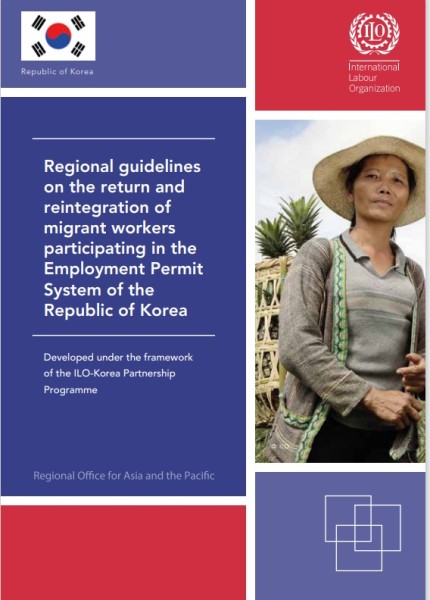Regional guidelines on the return and reintegration of migrant workers participating in the Employment Permit System of the Republic of Korea

Type
Lignes directrices
Pays
République de Corée
Région
Asie et Pacifique
Organisation
ILO International Training Centre
Année
2016
Language
Anglais
| Since 2012, the ILO-Korea Partnership Programme labour migration component has focused on migration and development. Research and national and regional workshops have focused on return and reintegration, leading to the development and adoption of these Regional Guidelines on Return and Reintegration Programmes. The Republic of Korea introduced the Employment Permit System (EPS) in 2004, which recognized the need for low-skilled workers by Korean enterprises (particularly of small and medium sizes) in construction, manufacturing, agriculture and services, and introduced a government–to-government labour recruitment programme based on mandatory Memorandum of Understandings (MOUs). A major achievement is the reduction in the average cost paid by a worker from US$3,509 under the trainee system in 2002 to US$927 under the EPS system in 2011 (Kyung 2013). While not a model in all respects, the EPS of the Republic of Korea is a better conceived, funded and implemented foreign-worker programme than most in the region. The EPS MOUs, with 15 countries of origin in Asia, require that all recruitment and placement of workers for the EPS are covered under Government-to-Government arrangements. The Government has also introduced standardized employment contracts for employers and workers. The purpose of these guidelines is to establish a framework for Employment Permit System (EPS) sending countries on the policy responses, institutional mechanisms and programmes or services required for the successful return and reintegration of migrant workers. The EPS sending countries to include Bangladesh, Cambodia, China, Indonesia, Kyrgyzstan, Myanmar, Mongolia, Nepal, Pakistan, Philippines, Sri Lanka, Timor-Leste, Thailand, Uzbekistan, Viet Nam, and other participants to this programme. |
Link to download file
